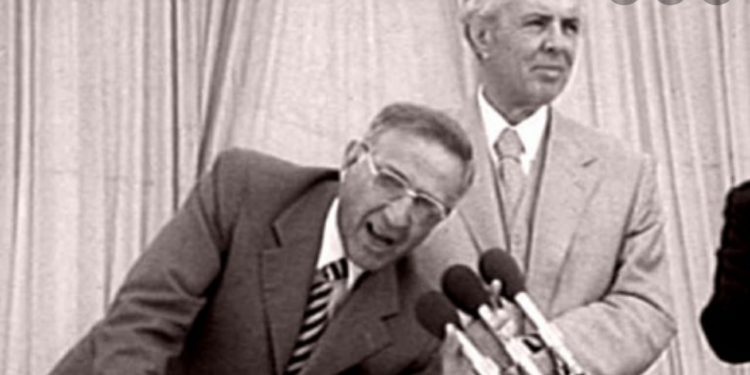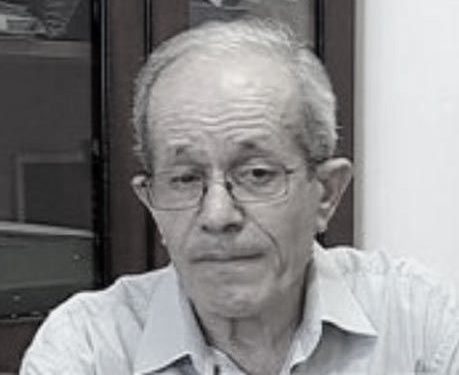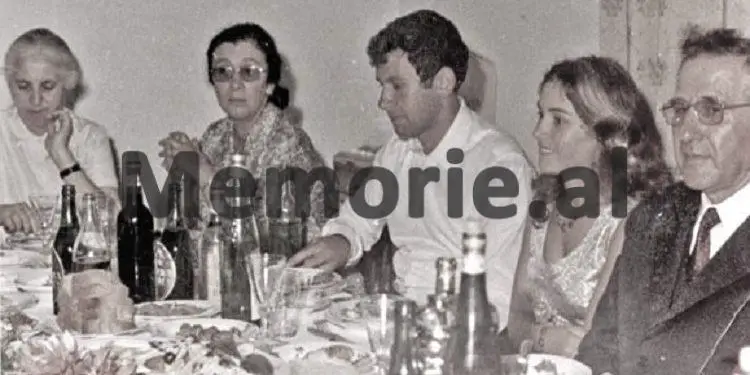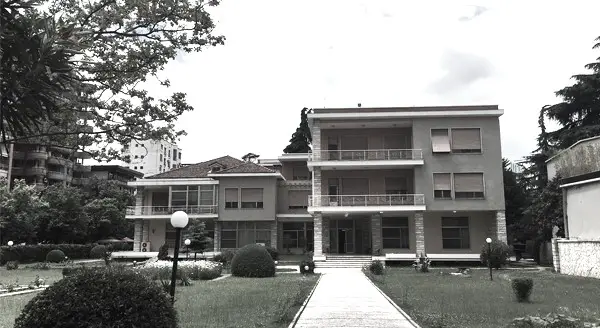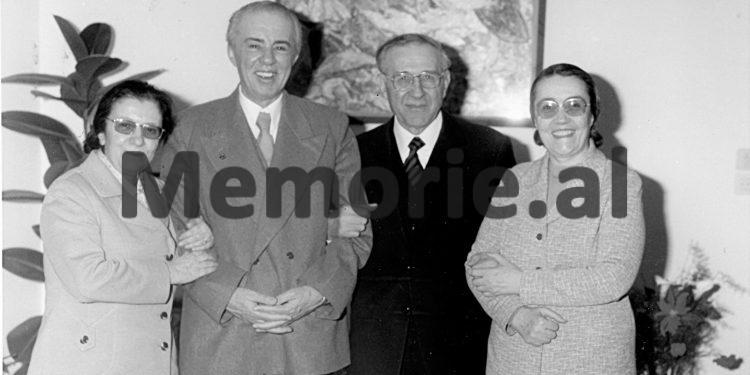By Prof. Dr. Rami Memushaj
-A personal experience, on the anniversary of Mehmet Shehu’s (own) murder-
Memorie.al / The beginning of the 1970s – the 20th century in Albania was accompanied by political developments that deeply shocked public opinion. Until then, among the common people, there was some optimism, seeing that the economic situation was improving and the market was not suffering for basic foods. Also, it was believed that the Party in power was on the right track and that within its ranks, there was a strong unity. But the events that followed the XI festival in December 1972 revealed that the unity was only in appearance, as proved by the IV plenum of the Central Committee of the Labor Party, which condemned for liberalism a number of artists, as well as political figures covering the art sector, which also held high party positions.
In August 1974, I was on summer vacation in the village, when one day, around 10 o’clock in the morning, I heard the voice of one of my cousins, who was working with the cows in the cooperative stable. How much was returned from Tirana, where he had visited his older brother, who was an officer. I quickly dressed and left for the stable.
How we hugged her, sat down and started talking about the young women from Tirana. “Don’t tell me,” he told me, “what’s going on over there.” Beqir Balluku was expelled from the Central Committee and dismissed as Minister of Defense. Hito Çakua and Petrit Dumia are also upset.” I parted with my cousin and returned home, thinking that in Tirana the war of the classes against the enemies of the Party and the State had begun, but the war of the clans for power.
On the pages of the newspapers, it was presented as a war against liberalism and bourgeois degeneration, but the scythe of traditional Albanian revenge, which was sold as a “class war”, spread liberally, as; Fadil Paçrami, Todi Lubonja, Abdyl Këllezi (yes, not Ramiz Ali!) etc., but also hard-line people, like; Beqir Balluku, Hito Çakua, Petrit Dumia, and others. So it seemed to be a clan war.
Many of these people with values as economists or as soldiers, we saw them being interned in Llakatund, Lubonjë and Selenica in Vlora, where they were left for a while, before they were given capital punishment. We did not understand the purpose of all those purges in all areas, such as: in art and culture, the army and the economy?! Why were the prisons filled with generals and prominent figures, why were the lives of hundreds of families destroyed, by imprisoning the heads of families and deporting them? What was the use of all this?
In those years, we were a small group of lab boys who shared the opinion that; at the head of the Party and the state, a fierce clan war was taking place, and we judged the promotion of incompetent people to the highest positions as a degradation of the state and the party. At that time, we knew nothing about the clash between Mehmet Shehu and his men, with Ramiz Alina, who was supported by Nexhmije Hoxha.
I had heard from someone that, after Enver published the book “Imperialism and revolution” (1978) or “Eurocommunism is anti-communism” (1980), Mehmet Shehu also wrote a book entitled “Capitalism” and that Enver did not like this who said: “We will all write books”?! (How true this is, Mehmet’s sons can know.)
The chance brought two of our friends from the 70s to meet in Tirana in September 1981: the writer of these posts is a lecturer at the University of Tirana, and B. B., a student at the “Vladimir Iliç Lenin” Party School. When I found out that my best friend had come to the Party School, I connected with him, and we started going out together every Saturday.
From the first meeting, B. told me that in Mehmet’s villa, the works had stopped. When I asked him why, he told me that one very hot summer night that year; Comrade Enver couldn’t sleep because of the loud noises outside.
He calls the guard officer and asks him what those noises were. The officer tells him that; work is done in the villa of friend Mehmet. “Yes, Comrade Mehmet is not outside”, says Enveri to the officer. That’s how long it took to stop the works. The following week (the second week of September), while we were walking in front of the flower garden at the end of which Mehmet’s villa stood, my friend told me that the engagement of Skenderi (Mehmet’s second son) with Silva Turdiu, the well-known volleyball player, was broken. “The Security guys solved that job,” he told me.
Recently, from reading Enver’s diary, which was published in a daily newspaper, I found out that the information about the girl’s family was given to him by Ramizi! Maybe 2-3 weeks passed, when my friend, who was part of the base organization, where Fiqretja was, told me that a meeting of this organization had been held, where Simon Stefani had also participated, as a delegate of the Political Bureau.
In that meeting, Fiqreta was asked to open up to the Party: to show where he was wrong, why he was wrong, what had pushed him to cross the Party line, about the class war, etc.
These meetings were repeated several times until they forced Fiqreta to “open up” with her mouth, to tell all the mistakes she had made in her life. After confessing orally, they forced him to self-criticize in writing. (Would the minutes of those meetings and the written self-criticism of Fiqreta have been preserved?)
Together with B. B. and my colleague Fatmir Agalliu, who was the only one in the department with whom we had such dangerous conversations, we realized that Mehmet Shehu was planned to disappear.
On December 18, 1981, I was at the Faculty of History and Philology of the U.S.H.T. (State University of Tirana). It was 9.30 in the morning; the first hour of the lesson had just ended and together with my colleague Agalliu, who also had the first hour of the lesson, we were sitting on the chairs next to each other and we were blowing our hands to warm up. After a while, a colleague who taught foreign languages entered the department and told us that; Bashkimi (Shehu) came and took his wife out of the lesson.
I, stepping on Fatmir’s foot, said to my colleague: “They will have a sick daughter”! We stayed in silence until the bell rang for the start of the second lesson and, when my colleague came out, I said to Fatmir: “Something must have happened to Mehmet Shehu”.
Since I only had one hour of class that day, I left the Faculty and took the road to “Avni Rustemi” square. In a nearby building lived a first cousin of mine, who had been a partisan in the First Assault Brigade and a senior military officer, who had been released before reaching the age of majority. I climbed the stairs in one breath and, as soon as I reached the door of his apartment, I rang the doorbell. He opened the door for me himself. How did we greet each other, I asked him: “Has anything happened to Mehmet Shehu”?! “Yes, – he told me, – he killed himself”!
We didn’t talk for a few moments. We got dressed and left the house, reached the Ministries, then headed for the Central Committee building. It was a very cold day and with a heavy rain, which did not even hold the 1,300-lek military boots! The “Martyrs of the Nation” promenade was empty; there was rarely a passer-by or a car. We walked like this until close to the Prime Minister’s building, then, seeing that nothing was moving, we parted, each to his own home.
It was only the next day that Mehmet Shehu’s death was announced. We were gathered in the large hall of the Faculty and the secretary of the Party office for the Faculty read Enver Hoxha’s letter, in which Mehmet Shehu was called a poly-agent on the one hand, while on the other hand it was said that with his murder he did great damage to the Party and the state.
Much has been written about this enigmatic murder. Was it a war to ensure the future of Nexmija’s children? Or was it the hand of the secret services?! Only two people could solve her enigma: Ramiz Alia and Nexhmije Hoxha. But the first ran away, taking the secret with him, while the second, trying to hide the truth, manages to declare cynically: “It is not Enver who killed Mehmet, but it is Mehmet who killed Enver”.(!) Memorie. al




